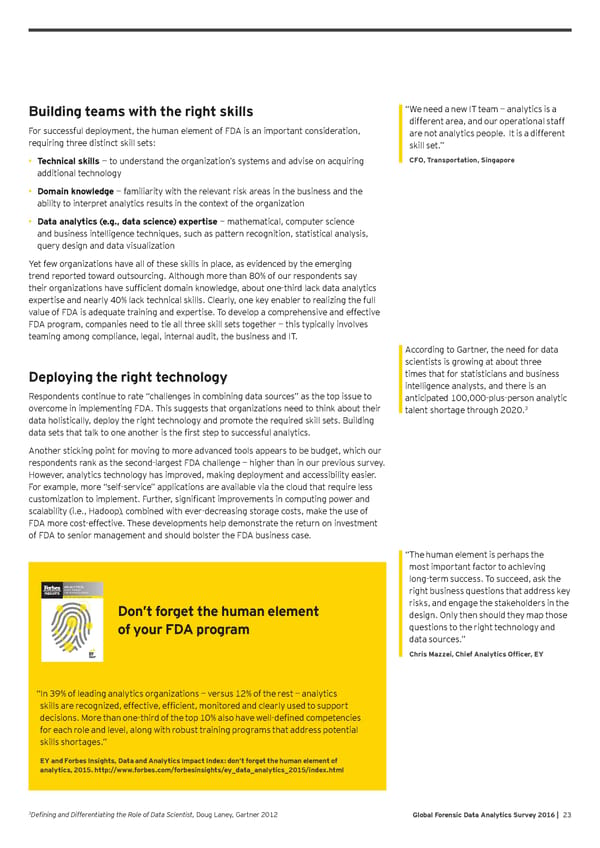Building teams with the right skills “ We need a new IT team — analytics is a different area, and our operational staff For successful deployment, the human element of FDA is an important consideration, are not analytics people. It is a different requiring three distinct skill sets: skill set.” • Technical skills — to understand the organization’s systems and advise on acquiring CFO, Transportation, Singapore additional technology • Domain knowledge — familiarity with the relevant risk areas in the business and the ability to interpret analytics results in the context of the organization • Data analytics (e.g., data science) expertise — mathematical, computer science and business intelligence techniques, such as pattern recognition, statistical analysis, query design and data visualization Yet few organizations have all of these skills in place, as evidenced by the emerging trend reported toward outsourcing. Although more than 80% of our respondents say their organizations have sufficient domain knowledge, about one-third lack data analytics expertise and nearly 40% lack technical skills. Clearly, one key enabler to realizing the full value of FDA is adequate training and expertise. To develop a comprehensive and effective FDA program, companies need to tie all three skill sets together — this typically involves teaming among compliance, legal, internal audit, the business and IT. According to Gartner, the need for data scientists is growing at about three Deploying the right technology times that for statisticians and business intelligence analysts, and there is an Respondents continue to rate “challenges in combining data sources” as the top issue to anticipated 100,000-plus-person analytic overcome in implementing FDA. This suggests that organizations need to think about their 3 talent shortage through 2020. data holistically, deploy the right technology and promote the required skill sets. Building data sets that talk to one another is the first step to successful analytics. Another sticking point for moving to more advanced tools appears to be budget, which our respondents rank as the second-largest FDA challenge — higher than in our previous survey. However, analytics technology has improved, making deployment and accessibility easier. For example, more “self-service” applications are available via the cloud that require less customization to implement. Further, significant improvements in computing power and scalability (i.e., Hadoop), combined with ever-decreasing storage costs, make the use of FDA more cost-effective. These developments help demonstrate the return on investment of FDA to senior management and should bolster the FDA business case. “ The human element is perhaps the most important factor to achieving long-term success. To succeed, ask the ANALYTICS: DON’T FORGET THE HUMAN ELEMENT right business questions that address key DATA AND ANALYTICS IMPACT INDEX risks, and engage the stakeholders in the Don’t forget the human element design. Only then should they map those of your FDA program questions to the right technology and data sources.” Chris Mazzei, Chief Analytics Officer, EY “ In 39% of leading analytics organizations — versus 12% of the rest — analytics skills are recognized, effective, efficient, monitored and clearly used to support decisions. More than one-third of the top 10% also have well-defined competencies for each role and level, along with robust training programs that address potential skills shortages.” EY and Forbes Insights, Data and Analytics Impact Index: don’t forget the human element of analytics, 2015. http://www.forbes.com/forbesinsights/ey_data_analytics_2015/index.html 3 Defining and Differentiating the Role of Data Scientist, Doug Laney, Gartner 2012 Global Forensic Data Analytics Survey 2016 | 23
 Shifting into High Gear: Mitigating Risks and Demonstrating Returns Page 22 Page 24
Shifting into High Gear: Mitigating Risks and Demonstrating Returns Page 22 Page 24